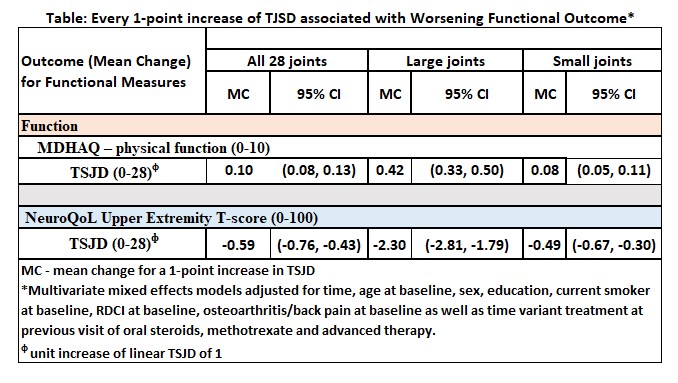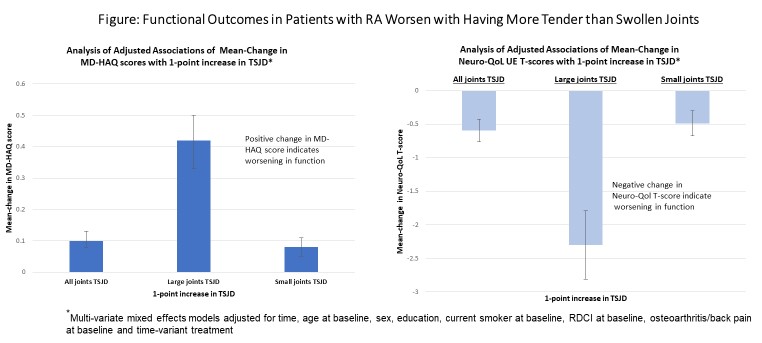Session Information
Date: Monday, November 13, 2023
Title: (1264–1307) RA – Diagnosis, Manifestations, and Outcomes Poster II
Session Type: Poster Session B
Session Time: 9:00AM-11:00AM
Background/Purpose: Early RA patients may present with more tender than swollen joints, which can persist during DMARD therapy. Elevated TSJD (tender-swollen joint difference) is often challenging for rheumatologists, as there may be multiple causes, and in some, it may contribute to overestimating disease activity scores and ineffective treatment decisions.Little is known about the phenotype and impact of TSJD on patient function. Our objective was to evaluate the distribution and impact of TSJD on functional outcomes in the first year following RA diagnosis, and to determine whether associations vary by joint size. A better understanding of pain patterns relating to TSJD may help identify patients who could benefit from adjunctive treatments targeted at different pain pathways.
Methods: Data were from patients with active, early RA enrolled in the Canadian Early Arthritis Cohort (CATCH), who completed assessments of general function (MDHAQ, range 0-10), upper extremity (UE) function of small and large joints (Neuro-QoL UE index, T-scores 0-100) over 1-year. 28 tender and swollen joint counts including 6 large joints (shoulders, elbows, knees) and 22 small joints (wrists, MCPs, PIPs) were performed. TSJDs were calculated by subtracting SJC from TJC at each visit. Adjusted associations between TSJD and functional outcomes (MD-HAQ and Neuro-QoL UE function T-score) were estimated in separate multivariable mixed effects models adjusted for age, sex, education, smoking, comorbidities, osteoarthritis/back pain and RA treatment. Separate analyses were performed for large versus small joint TSJD to examine potential differential impacts by joint size.
Results: Patients (n=549) were 70% female, mean (SD) age 56 (15) years, disease duration 5.3 (2.9) months. At baseline, 287 (52%) had TSJD >0, persisting in 32% at 12-months. 43% involved small joints and 34% had large joints, persisting at 12 months in 25% and 15% respectively. Higher TSJD was significantly associated with worse function [adjusted mean-changes (95%CI): MD-HAQ increase of 0.10 (0.08, 0.13) and decrease in Neuro-QoL UE function T-scores by -0.59 (-0.76, -0.43)] for every 1-point increase in TSJD (Table, Figure). Higher large joint TSJDs in particular were associated with the worst functional outcomes.
Conclusion: Having more tender than swollen joints is common in early RA. Higher TSJD score is associated with progressive worsening of functional outcomes, particularly when large joints are affected. Early identification and targeted intervention of predominantly tender joints may be needed to prevent long-term dysfunction.
To cite this abstract in AMA style:
Meng C, Lee Y, Schieir O, Valois M, Butler M, Boire G, Hazelwood G, Hitchon C, Keystone E, Tin D, Thorne C, Bessette L, Pope J, Bartlett S, Bykerk V. Having More Tender Than Swollen Joints Is Associated with Worse Functional Outcomes in Patients with Early RA in a Prospective Real-World Cohort [abstract]. Arthritis Rheumatol. 2023; 75 (suppl 9). https://acrabstracts.org/abstract/having-more-tender-than-swollen-joints-is-associated-with-worse-functional-outcomes-in-patients-with-early-ra-in-a-prospective-real-world-cohort/. Accessed .« Back to ACR Convergence 2023
ACR Meeting Abstracts - https://acrabstracts.org/abstract/having-more-tender-than-swollen-joints-is-associated-with-worse-functional-outcomes-in-patients-with-early-ra-in-a-prospective-real-world-cohort/


